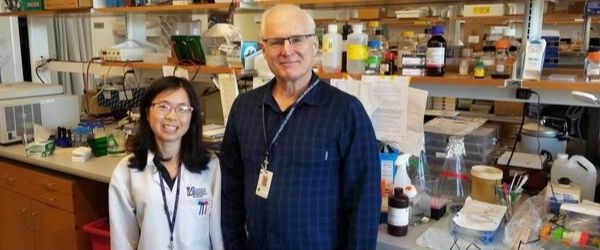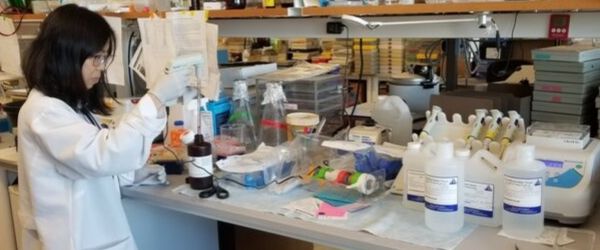From Stem Cells to Blood Flow: Studying the Effects of High Cholesterol on Artery Development

A study from the Messina laboratory in the Diabetes Center of Excellence at UMass Chan Medical School was published in JVS-Vascular Science, exploring how high cholesterol levels, known as hypercholesterolemia, can affect the growth of new blood vessels (collateral arteries), which are important for maintaining blood flow when main arteries are blocked. This is particularly relevant for conditions including peripheral arterial disease (PAD), where clogged arteries in the legs can lead to serious complications, including limb loss.
The study, led by former Messina lab postdoc Jinglian Yan, PhD, who is currently a Senior Scientist at Astellas Pharma, focused on a specific mechanism involving hematopoietic stem cells (HSCs), that can be converted into various types of blood cells, including a type of white blood cell called monocytes.

“We hypothesized that hypercholesterolemia affects these stem cells in a way that promotes the production of inflammatory cells called Ly6Chi monocytes and limits the production of cells that help form new blood vessels, Ly6Clow monocytes,” said Louis Messina, MD, The Johnnie Ray Cox Term Chair in Biomedical Research, Professor of Surgery in the Division of Vascular and Endovascular Surgery, and the Department of Molecular Cell and Cancer Biology.
To test this, the scientists used a model in which they transplanted stem cells from both normal and hypercholesterolemic mice into other mice.
“The mice receiving stem cells from mice with high cholesterol showed poor blood flow recovery and reduced artery enlargement, similar to what is observed in hypercholesterolemic conditions,” said Dr. Messina.
This indicated that the problem was linked to the stem cells themselves, not just the presence of high cholesterol. When cholesterol levels are high, it changes how these stem cells work. Specifically, it reduces the activity of a protein called Tet1, which is important for guiding stem cells to become helpful types of monocytes that promote blood vessel growth.
High cholesterol causes more of the stem cells to turn into "bad" monocytes (pro-inflammatory) that can cause inflammation, instead of "good" monocytes (proangiogenic) that help grow new blood vessels.
Because of this shift, the body struggles to grow new blood vessels in response to injuries, which can lead to poor blood flow and increased risk of serious conditions resulting amputations or heart issues.
“Tet1 plays a crucial role in this process by altering gene expression in the stem cells,” said Dr. Messina. “Restoring Tet1 expression in the stem cells of hypercholesterolemic mice improved artery enlargement and blood flow recovery.”
Currently, there is no highly effective drug or cell therapy available to boost blood flow in these vessels. The study's results offer a new direction for developing treatments that could help improve blood flow by targeting specific genes in stem cells.
“Our findings suggest that therapies targeting this specific mechanism could be developed to treat PAD and other conditions affected by poor collateral artery growth,” said Dr. Messina.
Understanding the genetic and cellular factors that contribute to vascular diseases can help in developing treatments for people with high cholesterol, aiming to improve their blood flow and overall health by targeting how these blood cells behave.
